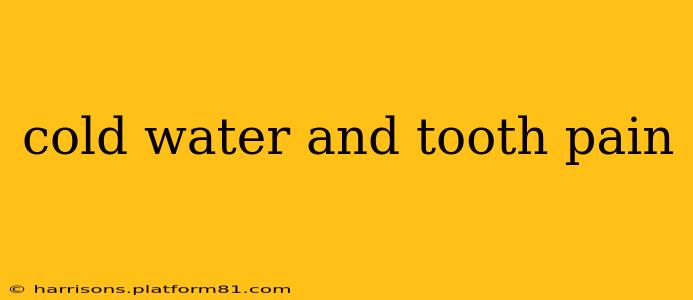Experiencing sharp, shooting pain in your teeth when you drink cold water? You're not alone. This common symptom can be indicative of several dental issues, ranging from minor sensitivities to more serious problems. Understanding the cause is crucial for effective treatment. This comprehensive guide will explore the link between cold water and tooth pain, delve into potential causes, and offer advice on finding relief.
What Causes Tooth Pain from Cold Water?
The most frequent culprit behind tooth pain triggered by cold water is dentin hypersensitivity. Dentin is the layer of tissue beneath your enamel, and it contains microscopic tubules leading to the nerve of your tooth. When enamel wears away or gums recede, these tubules become exposed, making the nerve vulnerable to temperature changes. Cold water stimulates these nerves, resulting in that familiar sharp pain.
Why Does My Tooth Hurt When I Drink Cold Drinks? (Addressing the PAA Question)
This is often the first question people ask when experiencing this type of pain. As explained above, the primary reason is exposed dentin. However, other factors can contribute, including:
- Cracked tooth: A crack or fracture in a tooth, even a microscopic one, can expose the dentin and nerves, leading to sensitivity to cold.
- Cavities: Decay weakens the tooth enamel, leaving the dentin vulnerable and causing pain with temperature changes.
- Gum disease (periodontitis): Receding gums expose the root surfaces, increasing sensitivity to cold, hot, and sweet substances.
- Recent dental work: Sensitivity is common after procedures like fillings, crowns, or whitening. This usually subsides within a few days or weeks.
- Abscess: A severe infection at the root of the tooth can cause intense pain, sometimes triggered by cold. This requires immediate professional attention.
How Can I Treat Tooth Sensitivity to Cold?
Fortunately, there are several ways to manage and often alleviate cold sensitivity:
- Desensitizing toothpaste: These toothpastes contain ingredients like potassium nitrate or strontium chloride that help block the tubules in the dentin, reducing sensitivity. Use them consistently as directed.
- Fluoride treatments: Fluoride strengthens enamel and can help reduce sensitivity. Your dentist can provide professional fluoride treatments or recommend fluoride mouthwash.
- Avoid irritating substances: Limit consumption of acidic foods and drinks (like citrus juices and soda), and minimize the use of abrasive toothbrushes.
- Proper brushing technique: Use a soft-bristled toothbrush and brush gently to avoid enamel erosion.
- Dental visit: If sensitivity persists or worsens, it's crucial to consult a dentist. They can diagnose the underlying cause and recommend the most appropriate treatment.
Is Tooth Pain from Cold Water Serious? (Addressing the PAA Question)
The severity of tooth pain from cold water depends on the underlying cause. While sensitivity is often a minor issue, pain caused by a cracked tooth, cavity, or abscess requires prompt dental attention. Ignoring severe or persistent pain can lead to more serious complications.
What Home Remedies Can Help with Cold Sensitivity? (Addressing the PAA Question)
While home remedies can provide temporary relief, they should not replace professional dental care. Some people find temporary relief from:
- Rinsing with warm salt water: This can help soothe irritated gums and provide temporary pain relief.
- Applying a cold compress to the affected area: This can help reduce inflammation.
When Should I See a Dentist About Cold Sensitivity?
It's important to see a dentist if:
- The pain is severe or persistent.
- The sensitivity is accompanied by swelling, throbbing, or fever.
- The pain interferes with eating or sleeping.
- You notice a change in the color or appearance of your tooth.
Ignoring persistent tooth pain, especially when triggered by cold, can lead to more significant dental problems. Early diagnosis and treatment are key to preventing further damage and discomfort. A visit to your dentist will help identify the root cause and ensure appropriate treatment.
